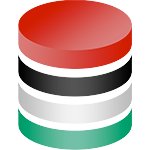
TikTok Genocide

Israeli soldiers fired dozens of tear gas canisters to prevent the olive harvest in Al-Nazla Al-Sharqiya
Original Social Media Post
"Hoje, na aldeia de Al-Nazla Al-Sharqiya, perto de Tulkarm, soldados sionistas atacaram agricultores e ativistas com gás lacrimogéneo, causando pelo menos um ferido e vários pequenos fogos, que foram apagados." - Source
Archivist Notes On This Video
"Today, Zionist soldiers fired dozens of tear gas canisters in record time. Less than five minutes after we began harvesting olives, we were already being expelled. There was no attempt to communicate or ask us to leave—only violence. At least one person was injured [by fleeing the gas], more than a hundred inhaled tear gas and several fires were started by the capsules (fortunately we managed to put them out). We shouldn't have been able to harvest even 20 olives, but we were there and we showed that we will not give up and that Palestinian farmers are not alone in defending their lands. Tomorrow the harvest continues. FREE PALESTINE!"
Context:
Al-Nazla al-Sharqiya (النزلة الشرقية) is a Palestinian town located in the northern West Bank, about 17 km northeast of Tulkarm, near the Green Line (the 1949 Armistice border with Israel).
Population: Around 3,000–3,500 residents (as of recent estimates). The town lies close to several other villages collectively known as the Nazlat area (like Al-Nazla al-Gharbiya, Al-Nazla al-Wusta, etc.). It’s under Israeli military control (Area B/C divisions) and often affected by movement restrictions due to its proximity to the separation wall and checkpoints.
Residents rely mostly on agriculture (especially olives and citrus) and some work in nearby cities or inside Israel with permits.
Like other northern West Bank towns, Al-Nazla al-Sharqiya has seen frequent raids, arrests, and military incursions in 2024–2025. Reports mention home demolitions, land confiscation, and incidents with settlers in nearby areas.
Event Notes
Olive harvest 2025 under attack (West Bank)The olive harvest is culturally, economically, and socially vital for many Palestinian communities. However, the 2025 season is expected to be subject to heightened risks. These stem from a combination of settler violence, restrictions on land access, environmental factors (including pests and climate change), and governance/policy issues.
Palestinian farmers experience frequent attacks during harvest time: vandalism of trees, burning or cutting down of trees, theft of crops, and intimidation. In many incidents, Israeli settlers are accompanied by Israeli occupation forces or benefit from insufficient protection by authorities. Some communities are identified as "hotspots" where violence or harassment recurs annually—especially villages near settlements, bypass roads, or in areas with settlement outposts. Certain governorates are likely to be more affected: Nablus, Ramallah, Hebron, Salfit, Qalqilya, and Tulkarem among them, especially for communities close to settlements or outposts.
Restrictions on Land Access: Many farmers are being denied or delayed access to their olive groves, especially where lands are near or behind settlements, barriers, or within Area C. Checkpoints, gates, and the requirement for permits (“prior coordination”) often limit access; in some cases entire orchards are inaccessible during the harvest. These restrictions negatively affect not only harvesting but all preparatory agricultural activities (pruning, fertilizing, pest control). Reduced maintenance further diminishes productivity.
Economic & Livelihood Impacts: Loss of harvest due to the above risks translates directly into financial harm: lost olive oil production, loss of trees (which are long‐term assets), missed market revenues. Many families rely heavily on olives and olive oil as a primary source of income; disruptions in harvest can undermine food security, household income, and cultural practices. The combination of environmental stressors (pests, climate) on top of security and access issues may lead to significantly lower yields in affected areas, potentially large economic losses and deeper food security challenges for vulnerable households.
Policy, Legal, and Institutional Risks: Permitting systems, zoning, rules about coordination for land access are sometimes arbitrary or revoked, making future planning difficult. These attacks or property damage often go without accountability.
Timeline of the main events
On October 10, a large-scale pogrom was carried out by 70 settlers and backed by Israeli soldiers, firing tear gas, stun grenade, and even live amnunition during the olive harvest in Beita, near Nablus. More than 12 Palestinian farmers and activist were wounded. The set fire at 8 cars including the vehcle of the AFP journalist. Another Palestinian journalist were injured.
On October 17, Israeli settlers attacked olive pickers in the towns of Aqraba, south of Nablus, and Farkha, south of Salfit in the occupied West Bank. A farmer had been picking olives with his wife and son when he was attacked and severely beaten by settlers. The farmer was later transferred to Salfit Governmental Hospital for treatment. According to Mustafa Hammad, head of the Farkha village council, the settlers had forced the farmer’s family off their land last week and returned this week.
At the same time, in Aqraba, settlers targeted farmers looking after their olive fields and forced them off their lands, second time since last week; Settlers targeted also farmers looking after their olive fields and forced them off their land.
In Silwad, Qabalan, Qusra, Ramin, Salem and the Beta area, settlers attacked Palestinians who were engaged in the harvest and prevented it. In Qusra, the settlers also opened fire on the harvesters.
At the harvest in Silwad, for example, which was held by Palestinian olive grove owners in cooperation with rabbinical human rights activists, instead of preventing the settlers from attacking, the army issued a closed military zone order, thereby effectively cooperating with the violence. The settlers also prevented rescue forces from entering the area, blocked an ambulance, and prevented the wounded from receiving medical treatment on the spot, while threatening that an "event" would occur if the ambulance reached the wounded.
On October 18, in Kobar, north of Ramallah, Israeli forces opened fire and launched stun and tear gas grenades at Palestinian farmers and journalists as they tried to access their land for the olive harvest. Soldiers fired at them, forcing them to retreat. No injuries were reported. “The (Israeli) occupation army prevented farmers from reaching their lands west of the village, particularly in the Qanater and Daak areas, and opened fire at them without causing injuries,” farmer Fahd Abu al-Hajj told Anadolu.
The details for each video come from social media. None of it has been verified.